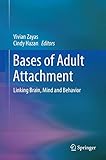Bases of Adult Attachment [electronic resource] : Linking Brain, Mind and Behavior / edited by Vivian Zayas, Cindy Hazan.
Material type: TextPublisher: New York, NY : Springer New York : Imprint: Springer, 2015Edition: 1st ed. 2015Description: XIII, 196 p. 7 illus. online resourceContent type:
TextPublisher: New York, NY : Springer New York : Imprint: Springer, 2015Edition: 1st ed. 2015Description: XIII, 196 p. 7 illus. online resourceContent type: - text
- computer
- online resource
- 9781461496229
- 155 23
- BF712-724.92
| Item type | Current library | Home library | Collection | Status | Barcode | |
|---|---|---|---|---|---|---|
 E-books
E-books
|
Library and Information Centre | Library and Information Centre | SN | Available | EBK53038 |
Part I: Introduction: Introduction and overview -- Part II: The processes that promote adult attachment formation: The distress-relief dynamic in attachment bonding -- An expectancy-value approach to attachment -- Part III: The effect of previous experience on adult attachment formation and maintenance -- Attachment and relationships across time: An organizational-developmental perspective -- The biobehavioral legacy of early attachment relationships for adult emotional and interpersonal functioning -- How early experiences shape attraction, partner preferences and attachment dynamics -- Part IV: Development and change in adult attachment bonds: Insights into the formation of attachment bonds from a social network perspective -- From an unknown other to an attachment figure: How do mental representations change as attachments form? -- Evidence from fMRI studies of adult pair-bonding. .
A great deal is known about how infants form attachments, and how these processes carry over into adolescence. But after that, the trail grows cold: the study of adult attachment emphasizes individual variations, paying little attention to the normative mechanisms of adult bonding. A much-needed corrective, Bases of Adult Attachment examines this under-investigated topic with an eye toward creating a robust theoretical model. The first volume of its kind, its multilevel approach integrates current findings from neuroscience and psychology to analyze the processes by which adult relationships develop, mature, function, and dissolve. Here in relevant detail are factors contributing to initial attraction, possible scenarios in the evolution from friendship to attachment, and the changes that occur on both sides of a relationship as partners mutually influence each other's behavior, emotions, cognition, and even physiology. And expert contributors address long-neglected questions in the field with stimulating topics such as: The distress-relief dynamic in attachment bonding. An expectancy-value approach to attachment. The biobehavioral legacy of early attachment relationships for adult emotional and interpersonal functioning. How early experiences shape attraction, partner preferences, and attachment dynamics. How mental representations change as attachments form. Insights into the formation of attachment bonds from a social network perspective. Bases of Adult Attachment will interest scholars approaching adult attachment at multiple levels of analysis (neural, physiological, affective, cognitive, and behavioral) and from multiple perspectives. This wide audience includes developmental, social, and cognitive psychologists as well as neuroscientists, neuropsychologists, clinicians, sociologists, family researchers, and professionals in public health and medicine.
There are no comments on this title.

